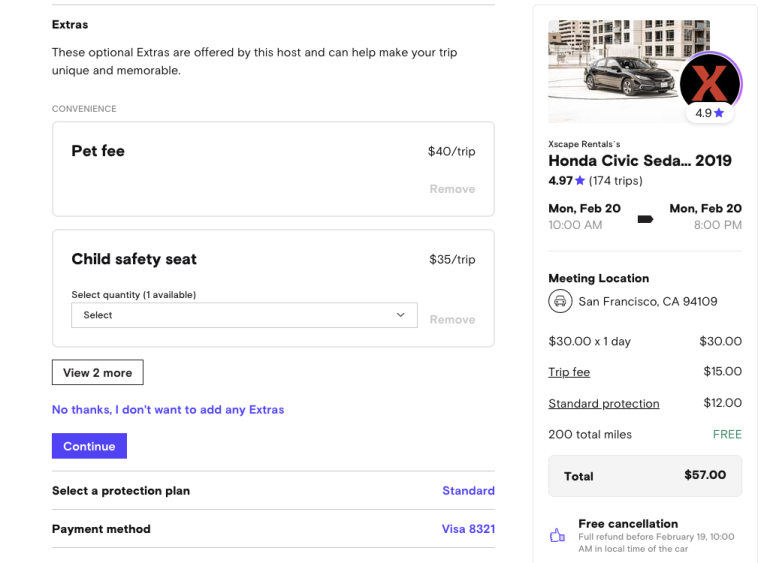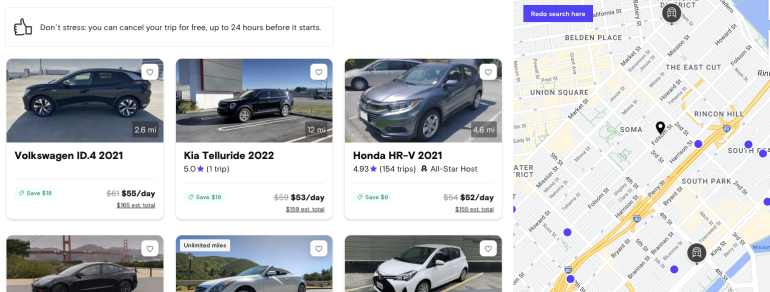The Pros and Cons of Turo
Turo is a peer-to-peer car sharing platform that allows car owners to rent out their own cars to regular people. Consider it a sort of Airbnb for cars.
Given high rental car prices and often limited rental car availability, alternative rental car services like Turo can be a lifesaver. After all, skyrocketing rental car prices became one of the biggest pandemic-era travel stories as they hit record highs in July 2021.
The story of rental cars experiencing massive price increases since the pandemic continues. According to the U.S. Bureau of Labor Statistics, January 2023 car rental prices were up 36{49e09b23eae7466ccc7574c19ebb3019301c9a11d2999feff81a3526451546a5} versus January 2020, the last comparable month before COVID lockdowns in the U.S.
Peer-to-peer car sharing platforms, meanwhile, have continued to grow in popularity. The global car sharing market surpassed $2 billion in value in 2020 and is expected to grow 20{49e09b23eae7466ccc7574c19ebb3019301c9a11d2999feff81a3526451546a5} annually from 2021 to 2027, acccording to July 2021 data from market researcher Global Market Insights.
But while Turo can provide an excellent rental car alternative, it’s not necessarily better. Here are some of the times you might consider booking with Turo, and what to look out for.
When you find lower prices on Turo
Traditional car rental prices are especially high compared to pre-pandemic times, but Turo prices are more variable. Sometimes they can be cheaper than traditional rental cars because car owners set the prices.
A car owner who now works from home and has minimal need for a car during the week might be inclined to make it available on Turo at a low price to make some extra cash or even to get some mileage out of a car that’s otherwise sitting idle.
Many owners offer discounts for longer trips, and some offer discounts to guests who book at least a week in advance.
The total cost to rent on Turo might balloon once extra fees kick in.

A 10-hour rental advertised at $30 per day can easily become twice that. In this example, there’s a mandatory $15 trip fee. Then, Turo adds standard protection for $12 by default (though you can decline damage protection). You might include extras such as a pet fee ($40), child safety seat ($35), unlimited mileage ($80) or prepaid refuel ($75).
Here are some examples of Turo fees you may be on the hook for before checking out:
-
Turo trip fee. Turo adds a trip fee at checkout that goes to Turo (not the owner). Fees vary, but in the U.S., trip fees range from 2.5{49e09b23eae7466ccc7574c19ebb3019301c9a11d2999feff81a3526451546a5} to 100{49e09b23eae7466ccc7574c19ebb3019301c9a11d2999feff81a3526451546a5} of the overall price.
-
Turo young driver fee. Folks under 24 owe a young driver fee (a minimum of $50 per day if under 21 or $30 per day if under 25 in the U.S.).
-
Miscellaneous extras. You may also owe other fees including airport fees, pickup or return fees, and optional extras like unlimited mileage (many rentals have a mileage cap).
And the fees might not end there, adding to why Turo could be wrong for folks anxious about potentially unknown costs.
-
Reimbursement bills. Hosts can send renters a reimbursement invoice for fuel replacement, distance overages, tickets and tolls, if applicable.
-
Turo cleaning fees. If you return a car in a condition that violates Turo’s cleaning and disinfection policy, the host can report the issue to the company. If Turo sides with the host, you’ll owe $150 for the cleaning violation plus a 3{49e09b23eae7466ccc7574c19ebb3019301c9a11d2999feff81a3526451546a5} processing fee.

(Photo courtesy of Turo)
Turo explicitly says that renters “aren’t expected to clean or disinfect the car before returning it,” but there’s a gray area between what Turo considers normal wear and tear versus what teeters into violation territory.
“Significant amounts of pet hair” are a violation, as are “major stains or residue,” but “minor food or beverage spills” are OK.
Plenty of renters have documented negative experiences of receiving violation penalties they felt were unjustified, leading to back and forths with customer service to get those fees removed — or just paying the fine.
If you don’t rely on car rental coverage through a credit card
Turo offers three optional protection plans at an additional cost, each with increasingly more insurance coverage: a minimum, standard and premier plan.
Depending on the level of add-on insurance from Turo selected, prices in the U.S. start as low as $10 per rental day. It’s pretty easy to compare and add plans at checkout.
You can decline protection, but you (or possibly your own personal insurance company, if covered) are responsible for all costs related to physical, mechanical, and interior damage, plus administrative claims fees and appraisal costs.
When renting on Turo, don’t assume your personal auto insurance policy or credit card coverage works in the same way it applies to traditional rental cars.
“Turo is not a rental car company,” according to a post on Turo’s site. “We’re a peer-to-peer car-sharing platform, so credit card companies may provide no coverage for a car booked through Turo.”
If you can pay for your rental car upfront
Turo has a generous cancellation policy, allowing you to cancel free of charge up to 24 hours before the trip starts. Trips canceled within 24 hours of the start time are typically entitled to a partial refund.
Refunds are issued immediately, though it can take three to five business days to receive the money.
While Turo’s cancellation policy is relatively generous, you still must pay upfront.
In contrast, most rental car companies allow payment at the counter. That’s convenient because if your travel plans change and you can no longer rent the car, you likely won’t be on the hook for a rental car reservation you didn’t show up for (though some do charge a no-show fee).
If Turo is more convenient to your destination
Turo operates in the U.S., Australia, the U.K. and Canada.
What’s unique about Turo is the range of places you’ll find the vehicles. Traditional rental car companies typically operate in places with a lot of tourists, such as airports, downtowns and hotels. But with Turo, you could very well find a car available from the home next door.

The map’s purple dots indicate available vehicles. You might find one in a location far more convenient than the nearest traditional rental car.
That’s convenient for someone who is usually car-free but wants to rent one every once in a while from a neighbor. Travelers who want a car only for part of their trip might skip the airport rental car and rent a Turo nearby for the days they need it.
But Turo isn’t available in every city. While it’s now available in all 50 states, it wasn’t until June 2022 that Turo launched in New York state. And within each state, Turo is still expanding. Availability is largely contingent upon whether a host is willing to post their car for rent.
If you need special pickup and drop-off
When renting from many rental car companies, you’re tied to their operating hours. That’s annoying if your flight lands at 9 p.m. but the rental car company closes at 8.
Many Turo rentals, however, are available for drop-off and pickup 24/7 because of a built-in service called Turo Go. Turo Go allows renters to unlock cars directly from the Turo app, thus never needing to meet the host in person.
Other hosts prefer in-person exchanges. The owner might pick you up at the airport and drive you to your hotel before handing over the keys (typically for an additional fee, though some hosts offer the service for free).
Turo’s delivery service can be especially convenient if you want the car for only a few days or a few hours.
While the range of pickup options can certainly be a pro, it also adds layers of complication — and it means your next Turo experience won’t be exactly like your last.
Read the pickup and drop-off rules carefully, as they vary by owner. Some cars are parked in facilities requiring a fee to exit. While Turo requires hosts to disclose such fees in their vehicle listing, it’s still one more annoying cost.
While Turo Go can certainly be convenient, you must have Wi-Fi or cellular data to unlock the car at the start of the trip. And you won’t have in-person customer support, which might pose challenges if you run into any problems upon pickup.
For one-way rentals, it’s tricky. You’re not able to book one location for pickup and a different location for return.
🤓Nerdy Tip
There is a one-way rental workaround where you can request to change your pickup or drop-off location once the trip is booked, but you’d have to work that out with the host — and it’s not guaranteed they’ll accept.

In a promotion for Netflix’s “Wednesday,” Turo once offered a hearse for rent in Los Angeles. (Photo courtesy of Turo)
Turo can provide myriad benefits. Especially in big cities, you might find a car in far more convenient locations. Turo Go enables pickup and drop-off at any hour, so you’re not constrained by rental car companies’ operating hours.
Because much of the rental price goes directly back to the car’s owner, more money stays in local communities. Turo often offers a range of cars, from a tiny Smart Car to electric vehicle rentals to flashy muscle cars.
But renting on Turo also entails high variability. The experience is rarely consistent, nor are the cars (or their owners). A vehicle might have squeaky brakes, and some owners might have higher cleaning standards than others.
Sometimes it’s cheaper, but once the fees add up (and you realize your credit card car rental insurance likely won’t kick in), it’s not always as budget-friendly as you might think.
How to maximize your rewards
You want a travel credit card that prioritizes what’s important to you. Here are our picks for the best travel credit cards of 2023, including those best for:









